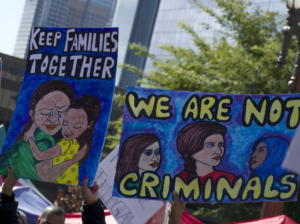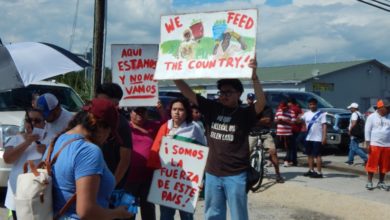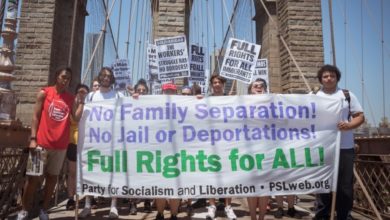
Continuing its attack on immigrants, the Trump administration on Jan. 8 cancelled the Temporary Protected Status for 200,000 Salvadorans who were allowed to stay in the United States since 2001, when two earthquakes shattered El Salvador that year.
The Salvadoran TPS designation was maintained until now by continued renewals during the Bush and Obama administrations, due to conditions of gang violence and poverty in El Salvador. It was ended by Trump’s Department of Homeland Security Jan. 8. Trump revoked Haitian and Honduran TPS status in November, setting the stage for deeper crisis in those communities.
The Temporary Protected Status is a federal program that began in 1990, after intense mobilization by Central Americans and their supporters.
For any country granted a TPS designation due to armed conflict, natural disaster or other extraordinary crisis, their nationals can remain in the United States for a period of time, but only if they were already in the United States at the time of the designation. That status can be extended. More than half of the Salvadorans under TPS were already living in the United States, many who escaped the terror of a U.S.-backed dictatorship during the 1980s civil war.
TPS has enabled immigrants to build their lives in the United States and raise families, especially with the economic crisis and pervasive gang violence back home.
Whether they are Central American, Haitian, Syrian, Mexican or Yemeni, millions of immigrants are forced to flee the economic and military destruction of their countries by U.S. imperialism.
Now the future for TPS Salvadorans and their children — who are mostly U.S. citizens — could be drastically affected.
Thousands of Salvadorans being targeted in most recent attack
There are 192,700 U.S.-born children of the Salvadoran TPS recipients, according to research by the Center for Migration Studies. A total of 273,000 children of Salvadoran, Haitian and Honduran TPS recipients were born in the U.S.
On Nov. 6, 2017, the Department of Homeland Security terminated TPS for Nicaraguans, ordering a deportation date of Jan. 5, 2019.
On Nov. 19, DHS terminated TPS status for 59,000 Haitians. They face a deportation deadline of July 22, 2019.
Haitians had been granted TPS after the 2010 catastrophic earthquake, which killed at least 300,000 Haitians. Haiti’s crisis has worsened in its aftermath, with a cholera epidemic and more than 80 percent of the people living in poverty, 55 percent in deep poverty.
Remittances from immigrants to TPS-designated countries are a major source of revenue and stability. Haiti alone depends on remittances that are 25 percent of its Gross Domestic Product.
TPS has been extended for Hondurans to July 5, 2018, but their status is also threatened, given the Trump administration’s now-predictable anti-immigrant actions.
Over 94 percent of all TPS members come from just three countries, El Salvador, Haiti and Honduras, 302,000 people. The other seven countries whose citizens have TPS status in the Untied States — some 18,000 people — are Nepal, Nicaragua, Somalia, South Sudan, Sudan, Syria and Yemen.
Effective immediately, Trump’s decision means Salvadorans who were on TPS lose their employment rights, and must leave the country by Sept. 9, 2019.
Causing economic hardship
Blocking TPS members from work will create economic hardship. Deportation will force a cruel separation of their families. Their children will have to live alone if they remain in the United States, or move with their parents to a country they never knew.
A much larger crisis of families being split up is on the near horizon, according to a 2017 study by CMS director Donald Kerwin and demographer Robert Warren.
The study shows that 3.3 million U.S. households are of mixed status, that is, one or more family members have residency or citizenship status — including 5.7 million children under 18. Others in the household are undocumented and face possible deportation.
The TPS attacks follow another blow: Trump announced the end of the program for 800,000 youth known as “Dreamers,” effective next March. Brought to the United States by their parents as minors, they qualified to stay in the U.S., to work and study, under the Deferred Action for Childhood Arrivals program, implemented by President Obama in 2012. Now DACA youth are set to lose their jobs, driver’s licenses, financial aid for college and be deported. Their parents face deportation, too.
Interview with Salvadoran-American community activist
Ramón Cardona is director of Centro Latino Cuzcatlán in the Bay Area and a longtime Salvadoran-American community activist. He said today, “The terrible notice of cancelling TPS is a nightmare that the Salvadoran community will suffer until September 2019. They are filled with anguish that they could be deported. It is the same for Haitians, for Hondurans and Nicaraguans, who barely know their country of origin anymore and whose children have no history there.
“DHS says El Salvador has overcome the conditions that created the TPS status. That is a lie. There is no way for those countries to receive them in an integral way, with such high unemployment and generalized crime.
“This is a true humanitarian crisis,” continued Cardona. “We have received calls and visits from TPS recipients all day, people crying, who tell us ‘I don’t know what I will do, maybe go to Canada.’ The vast majority is in shock.” He estimates that only about 15 percent of the TPS Salvadorans have possible options to file for some legal status.
Even Salvadoran President Salvador Sánchez Cerén called Homeland Security Secretary Kirstjen Nielsen last Friday, to urge her to postpone her decision until a Congressional solution could be found. She refused.
Cardona emphasized major steps in the coming fight.
“We must continue the struggle to create a favorable public opinion. We know that with this anti-immigrant phobia motivated by Trump, who gives carte blanche to white supremacists, it is not easy. But we have no other option.”
Cardona explained that a National TPS Alliance, “Salvemos al TPS,” has joined together affected communities and organizations in more than 32 cities to mobilize and fight for legislation that will allow permanent residency for TPS people.
Community organizing
The first Alliance conference was June last year. The second in October drew close to 400 people, with two-thirds being TPS recipients.
The next assembly will take place in Washington DC, Feb. 4-6. They plan to fill the halls of Congress to argue their case for legislation to protect TPS and raise visibility for the cause.
“We have done it before, during the 1980s when we fought in Congress and in 1990 TPS came into being,” says Cardona. “We sued the INS because it discriminated against the ABC settlement (American Baptist Church). Then, when Clinton signed the 1996 arch-reactionary, anti-immigrant law (IIRIRA), we succeeded with CARA, the Nicaraguan and Central American Relief Act.
Cardona has no illusions about the ominous situation ahead. “When DHA said Haitians’ TPS should expire, claiming they were no longer in danger, that was our alarm. Haiti is in worse condition economically and socially than any other group, and yet they have been denied.”
A severe restriction in the Illegal Immigration Reform and Immigration Responsibility Act of 1996, pushed and signed by President Bill Clinton, provides that anyone who entered the United States “without inspection” and has lived here more than a year, once deported, is barred from applying for re-entry for 10 years. Before Clinton’s law, if that person became married to a U.S. citizen, he or she was allowed to remain in the United States while applying to legalize due to their marriage status. Or they could be sponsored by a family member who became eligible to do so. After IIRIRA, now that person must leave the United States for 10 years, and apply from abroad, with no guarantee of being granted permission to return.
“Without inspection” refers to someone who entered without permission, versus the other scenario, entering with a visa. But someone who overstays an entry visa, usually a tourist, can remain in the United States while processing for legalization, if they meet other criteria.
The IIRIRA law has contributed to widespread racist discrimination against poorer immigrants from oppressed countries, especially Latino immigrants whose only usual option is to enter by crossing the Mexican-U.S. border.
“Brown-skinned immigrants, Mexican, Central American, are blatantly discriminated against. In 2017 for instance, the immigrants who overstayed their tourist visas the most are Canadians, 142,000. Only 74,000 Mexicans overstayed visas. Over 600,000 people, Europeans, Canadians, overstayed, but you don’t see them targeted,” said Cardona, exasperated. “This is so racist.”
Protests will continue to take place where TPS recipients are in higher concentration, including Los Angeles, Houston and Washington DC. A mass meeting of TPS recipients is expected Dec. 13 at the Salvadoran consulate in San Francisco.
In a protest at the S.F. Federal Building on Dec. 5, immigrants from several TPS communities spoke of the real crisis they now face. But they also promised to fight with determination and unity for their right to stay home in the United States.
Cardona says, “We will continue the popular struggle so everyone understands immigrants have contributed so much, economically, socially and in many practical ways. From DACA to TPS and all immigrants, these are intolerable attacks on vibrant, hard-working people.”
The racist, anti-immigrant offensive by Trump’s government must be strongly opposed by all. There are no borders in the workers’ struggle!






